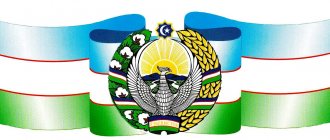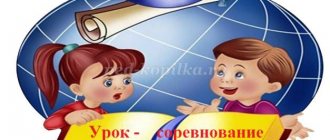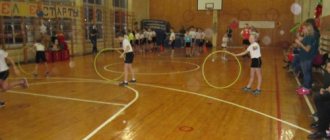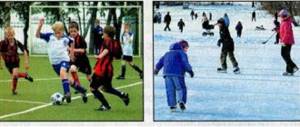Extracurricular activities in mathematics in primary school
Teaching mathematics as an elective: tasks
Extracurricular activities should not be like regular classroom activities.
At the same time, any activity related to the study of mathematics in elementary school should be aimed at achieving the main goal: expanding the mathematical horizons and erudition of students. Objectives of the extracurricular activities course in mathematics for students in grades 1-4:
1. Teaching the elements of logical and algorithmic literacy, communication skills of junior schoolchildren using collective forms of organizing classes and using modern teaching tools.
2. Development of students’ mathematical abilities, observation, geometric vigilance, abilities to analyze, guess, reason, prove, and solve educational problems creatively.
3. Cultivating interest in the subject, in the “discovery” of original ways of reasoning, developing research skills.
Let's take a closer look at how to implement this in the classroom.
General aspects of extracurricular mathematical activities in primary school
- The game situation is closely related to the assigned educational task.
- Additional materials are used: tangram, corners, colored triangles.
- Digital devices are used whenever possible, including an interactive whiteboard.
- The conditions of the games and the company of other players deter children who have difficulties with voluntary behavior.
- The approach to revealing this or that fact during the game is mathematically correct, accessible, and as accurate as possible (taking into account age characteristics, requirements, and specific goals).
- The content of any game provides for the achievement of not only subject (mathematical) goals, but also the goals of forming educational activities, developing imaginative and logical thinking.
- Extracurricular work contributes to the development of communication skills, such as the desire to communicate, the ability to listen, the ability to navigate a situation (to whom, why and what I say), knowledge of the norms and rules of communication, the ability to control speech, and correct oneself.
Entertaining mathematics. 1 class. Workbook
The manual can be used in elementary school when conducting math electives, clubs, olympiads, the Erudite club, intellectual marathon and other forms of organizing extracurricular activities for students. The materials in the manual will help the teacher not only in preparing and conducting these forms of organizing activities, but will also help take into account the individual characteristics and needs of students during the organization of extracurricular activities. The tasks included in the workbook help children develop independence, observation, geometric vigilance and reasoning skills, and also create conditions for the development of interest in mathematics, mathematical outlook and erudition of students.
Buy
Mathematical material and universal educational activities in games
- Comparison of different methods of action, selection of convenient methods for performing a specific task.
- Modeling during a joint discussion of an algorithm for solving a numerical crossword puzzle, using it during independent work.
- Apply learned teaching methods and calculation techniques to work with number puzzles.
- Analysis of the rules of the game, action in accordance with the given rules, inclusion in group work.
- Participation in the discussion of problematic issues, expressing one’s own opinion and argumentation.
- Argumentation of one’s position in communication, acceptance of different opinions, use of criteria to substantiate one’s judgment.
Organization of a math lesson
The creators of the course “Entertaining Mathematics” propose organizing several activity centers in the classroom:
- "Math Games"
- "Constructors"
- "Entertaining tasks"
- "Math Puzzles"
- "Tasks on the computer"
Children are divided into groups and work alternately in different work areas. This allows you to move away from the strict form of working at desks. Activity centers can be added or reduced depending on educational objectives, class characteristics, and student needs. If there are 5 work zones, then there are also 5 groups of children. Since the lesson lasts 45 minutes, the group is given 7 minutes for each center, and at the end the work is summed up.
Methodological recommendations for organizing extracurricular activities represent a variety of forms of work. Manuals “School of the 19th Century Erudite. Entertaining mathematics" (grades 1-2), in addition to the tasks themselves, contain answers and cut-out material.
Entertaining mathematics. 2nd grade. Workbook
The manual can be used in elementary school when conducting math electives, clubs, olympiads, the Erudite club, intellectual marathon and other forms of organizing extracurricular activities for students. The materials in the manual will help the teacher not only in preparing and conducting these forms of organizing activities, but will also help take into account the individual characteristics and needs of students during the organization of extracurricular activities. The tasks included in the workbook help children develop independence, observation, geometric vigilance and reasoning skills, and also create conditions for the development of interest in mathematics, mathematical outlook and erudition of students.
Buy
Examples of tasks:
"Games with cubes"
Prepare two dice with dots for the game. You can cut and paste them using the workbook app. Write your names in the table. Roll two dice at a time. Count the dots on the top faces of the two cubes. Record your results in a table. Play six rounds.
Result:
repetition of numbers, development of social skills.
"Travel Points"
(a checkered field is used)
Draw a line from the marked point:
- One cell to the right
- One cell down
- One cell to the right
- One cell down
Result:
the beginning of the development of spatial thinking.
"Number Puzzles"
(4x4 Sudoku game fields are used)
Sudoku is a popular number puzzle. Translated from Japanese, “su” means “digit”, “doku” means standing alone. Arrange the numbers from 1 to 4 so that each number appears only once in a column, in a row and in each square of four cells.
Result:
developing the skills needed to solve number puzzles.
The choice of a collective, group game is primarily determined by an accurate consideration of the level of development of students’ thinking and the level of development of their communication skills. In addition, in teaching it is important to use the property inherent in children's play - the effective implementation of the potential for involuntary assimilation of facts, information, and skills.
See also:
General concept of primary education from N.F. Vinogradova in the new free textbook “Primary School of the XXI Century”!
We are friends with mathematics. 2nd grade. Workbook
The tasks in the manual help prevent possible difficulties in mastering the main topics of the second year of mathematics, help develop spatial concepts, geometric observation of students, and develop self-control skills.
Buy





